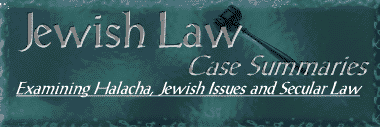

Case Summaries
-- Witnesses
Witnesses
- Smilow v. U.S.
- Witness' claim that if he testified he would suffer "divine punishment and ostracism from the Jewish community as an informer" was outweighed by needs of the state.
465 F.2d 802 (2nd Cir. 1972)
- U.S. v. Huss
- Witnesses could not refuse to testify on grounds that Jewish law forbids testimony against fellow Jew in non-Jewish court.
482 F.2d 38 (2nd Cir. 1973)
- Matter of Fuhrer
- Not everything told to a Rabbi is protected by clergyman-penitent privilege.
- Bet Din's threat of excommunication does not absolve Jew from testifying before civil court.
419 NYS2d 426, 100 Misc.2d 315 (19 )
- United States v. Braunstein
- Defendant's motion to stand trial separately from his son because their religious beliefs prohibited them from testifying against each other was denied because (among other grounds) if defendant were as observant as he claimed he would follow religious requirement to confess.
474 F. Supp. 1 (D. N.J.1979)
- In re Three Children
- Motion, on religious grounds, to quash subpoenas directing children to testify before a federal grand jury investigating children’s parent denied; parent-child testimonial privilege based on Jewish religious law not available.
24 F. Supp.2d 389 (D. N.J. 1998), No. MISC. No. 98-100. Dated December 2, 1998. Opinion by J. William H. Walls
- In re Grand Jury Empaneling of the Special Grand Jury
- Motion, on religious grounds, to quash subpoenas directing children to testify before a federal grand jury investigating children's parent denied; parent-child testimonial privilege based on Jewish religious law not available; the Religious Freedom Restoration Act .was not violated because the subpoenas were the least restrictive means of serving the government's compelling interest; court could rely on government's ex parte ,Schofield affidavit@ and, despite the witnesses free exercise defense, did not have to divulge its contents to the witnesses or grant the witnesses an evidentiary hearing on their motion to quash.
171 F.3d 826 (3d Cir. 1999), affirming 24 F. Supp.2d 389 (D. N.J. 1998), No. 98-6415. Dated March 19, 1999. Opinion by J. Sloviter. Dissenting opinion by J. McKee.
- Lightman v. Flaum
- Unauthorized disclosure during child custody dispute of wife's confidential communications to Rabbis concerning relationships with other men and her cessation of the observation of religious laws of ritual purity following menses so she would not have to engage in sexual relations with her husband violated clergy-penitent privilege unless made in the presence of third persons; such disclosure subjected Rabbis to action in damages, both for violation of the privilege and for intentional infliction of emotional distress; however, Rabbi's statements in an affidavit submitted to the court in the context of a marital proceeding to determine temporary child custody were privileged and action in defamation had to be dismissed; New York law.
179 Misc. 2d 1007, 687 N.Y.S.2d 562 (N.Y. Sup. Ct. 1999), Index No. 2169/97. Dated March 4, 1999. Opinion by J. David Goldstein.
Copyright © 1997-2008 by Ira
Kasdan. All rights reserved.
DISCLAIMER